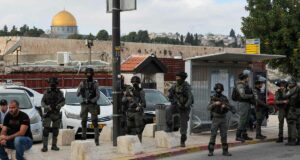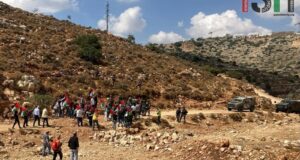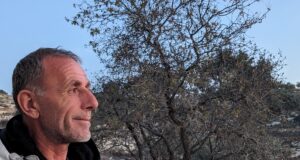18 July 2012 | Popular Struggle Coordination Committee
Jawaher Abu Rahmah from the West Bank village of Bil’in village, died of cardiac arrest caused by inhalation of excessive amounts of tear gas. The Israeli High Court laid the onus of collecting evidence to justify an investigation on the family, instead of police.
Israeli High Court judges ruled today that the family of the late Jawaher Abu Rahmah and the Bil’in Popular Committee should submit documents and testimonies indicating that Abu Rahmah’s death was caused by tear-gas inhalation to the Israeli Judge Advocate General (JAG) until September 1st. The Justices ordered to reconsider his decision to not launch an investigation of the incident
By doing so, the court unjustly laid the burden of collecting evidence with the victims to justify the opening of an investigation, while it should clearly lay with the authorities and, in fact, be the result of such an investigation. During the hearing, Jusitce Miriam Naor told the State Attorney that once the evidence is submitted by the appellants, “[The State] must consider whether to launch an investigation with an open mind. After all, demonstrations do not normally end in death.”
The ruling was given at the conclusion of the first hearing in an appeal launched by Abu Rahmah’s mother, Subhiyah, and the Bil’in Popular Committee Against the Wall and Settlements, with the assistance of the Israeli human rights organization, Yesh Din. The appellants petitioned that the court instruct the JAG to investigate the circumstances surrounding the death of Jawaher Abu Rahmah, who collapsed during a demonstration in Bil’in, after breathing tear gas shot by Israeli forces in massive quantities to disperse the protesters.
Mohamad Khatib of the Bil’in Popular Committee said, “Israeli forces regularly use excessive force to try and crush Palestinian demonstrations. With more than 270 unarmed demonstrators killed since the year 2000, no lip service comment by the judiciary on the informality of how our people are slain is going to cut it. Israeli soldiers are sheltered by a wall of unaccountability, supported by today’s ruling that it is the victims who should produce evidence, and not a criminal investigation by the authorities.”
Background
Jawaher Abu Rahmah, 36, resident of the Palestinian village of Bil’in, was hurt on December 31, 2010 during the weekly demonstration against the route of the separation barrier on her village’s land. According to demonstrators’ testimonies, Israeli security forces used widespread and perhaps unprecedented quantities of tear gas that day, to disperse the demonstration. At some point Jawaher, who was standing next to her house inside the village, some distance from site the demonstration, was caught in a cloud of tear gas. As a result of inhaling the gas, Abu Rahmah began to suffer from respiratory distress and collapsed shortly thereafter. She was evacuated to a hospital in Ramallah, where she died less than 24 hours later. In the days following the incident, anonymous Israeli Army sources released varied and unlikely claims about the circumstances of Abu Rahmah’s death – including the untruthful claim that she was a leukemia patient – and all so as to persuade the public, with no investigation, that the Israeli Army is not responsible for her unnecessary death, and even that the Palestinians had invented the details of the incident.
Instead of immediately ordering an investigation into the circumstances of her death, the Israeli Army held only an operational debriefing. According to the petitioners, the operational debriefing is a tool to derive operational lessons, but is not a tool meant to collect evidence or establish personal responsibility, and therefore cannot substitute a criminal investigation. The findings of the debriefing are confidential, and it is not known what investigative activity was carried out, who was interviewed or which documents were made available to the investigators. However, we do know that not a single civilian eyewitness was questioned, not one medical professional was interviewed, and apparently no medical documents were made available to the investigators.
In the JAG’s response to the petitioners’ inquiry shortly after the incident, he rejected the demand to open an investigation, claiming that the operational debriefing and other inquiries made after the event found that “there was no causal link between the event and the death of the deceased.” This contradicts the recent change in Israeli Army investigation policy which was declared just days before the Turkel Commission, according to which a criminal investigation would be launched into every Palestinian civilian death which occurs during an Israeli Army operation in circumstances that is not “actual combat.” The JAG admitted that had Jawaher been killed today he would have ordered an investigation. Thus, the JAG Corps is evading launching an investigation, hiding behind the “technical” argument that the policy was changed a few weeks after the incident.
The petition argues that the decision not to order a criminal investigation of the event is unreasonable in the extreme, because “the circumstances and reasons for the death of Jawaher, an unarmed civilian who was hurt while in the middle of her village, are unclear to this day, and in view of the fact that her death was not a ‘natural death,’ the respondent is obligated by both Israeli law and international law to investigate her death.
 International Solidarity Movement Nonviolence. Justice. Freedom.
International Solidarity Movement Nonviolence. Justice. Freedom.


